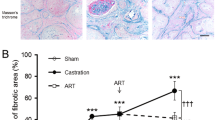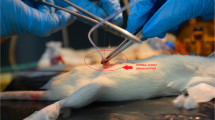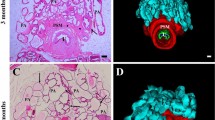Abstract
The effect of testosterone, dihydrotestosterone, 3 beta-androstanediol and oestradiol-17 beta on the morphology and RNA synthesis in human benign prostatic hyperplasia (BPH) in organ culture has been investigated. In hormone treated and untreated explants alike, the epithelium multiplied to form several layers. This effect was most marked after exposure to dihydrotestosterone. In explants grown in non-supplemented medium the epithelium showed some squamous changes; testosterone or dihydrotestosterone preserved the secretory character of the epithelium while oestradiol-17 beta caused cellular degeneration. The incorporation of 3H-uridine into RNA was studied by autoradiography. In the epithelium, testosterone or dihydrotestosterone raised the uptake significantly over that measured in the control explants, oestradiol-17 beta reduced it while 3 beta-androstanediol produced similar values to those found in the control explants. The incorporation of 3H-uridine in the smooth muscle cells was increased by testosterone and decreased by oestradiol-17 beta. A comparison with normal rat prostatic epithelium in organ culture showed that in the absence of androgens the incorporation of 3H-uridine was lower than in BPH and the effect of testosterone correspondingly greater. The results suggest that although the growth of human BPH in organ culture appears to be androgen dependent, it still remains hormone sensitive and can be influenced by steroid hormones in a similar manner to that in rat prostatic gland. They further show that the smooth muscle of the stroma is also hormone sensitive, a point which should be considered in the hormonal management of benign prostatic hyperplasia.
This is a preview of subscription content, access via your institution
Access options
Subscribe to this journal
Receive 24 print issues and online access
$259.00 per year
only $10.79 per issue
Buy this article
- Purchase on Springer Link
- Instant access to full article PDF
Prices may be subject to local taxes which are calculated during checkout
Similar content being viewed by others
Rights and permissions
About this article
Cite this article
Lasnitzki, I., Whitaker, R. & Withycombe, J. The effect of steroid hormones on the growth pattern and RNA synthesis in human benign prostatic hyperplasia in organ culture. Br J Cancer 32, 168–178 (1975). https://doi.org/10.1038/bjc.1975.146
Issue Date:
DOI: https://doi.org/10.1038/bjc.1975.146



